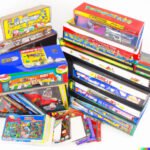Are you a fan of classic Hasbro board games? Look no further. In this article, we will explore the timeless appeal of some of the most iconic board games from Hasbro. From the rich history of these games to their enduring popularity, we will delve into what makes them a favorite among families and friends for generations.
For decades, Hasbro has been synonymous with family fun and entertainment. The brand’s classic board games have brought joy and laughter to countless households around the world. With a focus on bringing people together and creating memorable experiences, Hasbro has cemented its place as a leader in the world of traditional board games.
Join us as we take a deep dive into the history and enduring popularity of iconic games such as Monopoly, Scrabble, Clue, and Risk. We will unpack the intrigue and mystery behind these timeless favorites, examining their strategic depth and global appeal. Stay tuned for an exploration of vintage editions and modern variants, as well as a look ahead to new releases and innovations in the world of classic Hasbro board games.
The History of Hasbro
Hasbro has been a household name for decades, providing families with quality entertainment through their classic board games. The history of Hasbro dates back to the early 20th century when the Hassenfeld brothers founded the company in Providence, Rhode Island. Originally a textile remnant company, they shifted their focus to manufacturing school supplies and modeling clay before eventually finding success in the toy industry.
As Hasbro began to expand, they acquired various game and toy companies, including Parker Brothers and Milton Bradley. This allowed them to add iconic titles such as Monopoly, Scrabble, Clue, and Risk to their portfolio. These acquisitions played a crucial role in shaping the brand and solidifying its reputation as a provider of classic family-friendly entertainment.
Under the leadership of visionary individuals such as Alan Hassenfeld and Stephen Hassenfeld, Hasbro continued to grow and innovate. They maintained their dedication to creating high-quality games that brought joy to families worldwide. Today, Hasbro’s legacy lives on as they continue to uphold their commitment to providing timeless fun through their classic board games.
- The Hassenfeld brothers’ journey from a textile remnant company to a leading toy and game manufacturer
- Acquisitions of Parker Brothers and Milton Bradley and the impact on Hasbro’s game portfolio
- Visionary leadership that contributed to the enduring success of Hasbro’s classic board games
Iconic Game #1
Monopoly, one of the most iconic and enduring classic Hasbro board games, has captivated players for decades with its combination of strategy, negotiation, and luck. The game’s rich history dates back to the early 20th century when it was first patented by Lizzie Magie as “The Landlord’s Game.” However, it was not until the game was published by Parker Brothers in the 1930s that it gained widespread popularity and became the household name it is today.
The Origins of Monopoly
Originally designed as a commentary on economic inequality and the drawbacks of monopolies, Monopoly underwent several changes before evolving into the game we know today. The familiar board featuring properties like Boardwalk and Park Place, along with iconic playing pieces such as the top hat and thimble, have become symbols of this beloved classic. Over the years, various editions of Monopoly have been released, featuring different themes and variations that continue to attract new generations of players.
The Enduring Appeal
What makes Monopoly stand the test of time? Its mix of strategy, resource management, and immersive gameplay has contributed to its enduring appeal. The element of chance introduced by rolling dice adds an unpredictable aspect that keeps each game fresh and exciting.
Furthermore, the satisfaction of amassing wealth through clever investments and shrewd negotiations resonates with players of all ages. Whether you’re a seasoned player or a first-time participant, Monopoly’s timeless charm continues to draw families and friends together for hours of entertainment. With digital versions now widely available, the classic board game has even reached new audiences in the digital age.
Modern Variants
In recent years, Hasbro has kept Monopoly relevant by introducing modern variants that cater to diverse interests. From themed editions based on popular franchises like Star Wars or Game of Thrones to special editions celebrating cities around the world, these innovative takes on the classic game offer fresh experiences while retaining the core mechanics that make Monopoly a timeless favorite.
As technology continues to reshape how we play games, there is undoubtedly more innovation in store for this enduring classic Hasbro board game.
Iconic Game #2
Scrabble is one of the most beloved classic Hasbro board games, known for its timeless appeal and enduring popularity. The game was first created by Alfred Mosher Butts in 1938, but it wasn’t until 1948 that it was trademarked as Scrabble and sold to the public. Since then, Scrabble has become a staple in many households, captivating players with its simple yet challenging gameplay.
The appeal of Scrabble lies in its ability to engage players of all ages. The game not only tests one’s vocabulary and spelling skills but also requires strategic thinking and planning to outscore opponents. This combination of mental stimulation and competitive fun has made Scrabble a favorite pastime for families, friends, and word enthusiasts around the world.
One of the factors contributing to the enduring appeal of Scrabble is its adaptability to modern times. The game has transitioned into digital platforms, allowing players to enjoy it online with friends or against computer opponents. Online versions have also introduced new features such as word validation and instant scoring, giving the classic game a contemporary twist while retaining its original charm.
A study conducted by Hasbro revealed that despite the rise of digital entertainment, classic Hasbro board games like Scrabble continue to hold a special place in people’s hearts. The nostalgia associated with gathering around a physical board, drawing letter tiles from a bag and strategically placing them on the grid creates an irreplaceable social bonding experience that transcends generations.
As long as there are words to be formed and points to be scored, Scrabble will continue to captivate players old and new for years to come.
| Scrable Statistics | Data |
|---|---|
| Year Trademarked | 1948 |
| Digital Platforms | Available |
Iconic Game #3
Clue, also known as Cluedo outside of North America, is a classic Hasbro board game that has captured the imagination of players for decades. The game was first patented in 1947 and has been enjoyed by families and friends ever since. Clue is a murder mystery game that requires players to use deductive reasoning to solve the identity of the murderer, the weapon used, and the location of the crime.
The appeal of Clue lies in its combination of strategy, deduction, and suspense. Players must gather clues, make educated guesses, and ultimately reveal the solution to the murder mystery. The game’s replay value is high due to its dynamic nature – no two games are ever the same. This timeless quality has cemented Clue’s status as one of the iconic classic Hasbro board games.
One unique aspect of Clue is its immersive storytelling component. Each player takes on the role of a character with their own backstory and motivations, adding an extra layer of depth to the gameplay experience. This element sets Clue apart from other classic Hasbro board games and allows for an engaging narrative that unfolds as players strive to solve the mystery at hand.
- Clue provides a thrilling blend of logic and intuition
- The game encourages social interaction and cooperative problem-solving among players
- There are various editions and variations available, catering to different themes and periods
Iconic Game #4
Risk is one of the classic Hasbro board games that has stood the test of time, captivating players with its strategic depth and timeless fun. The game was first introduced in 1957 by French filmmaker Albert Lamorisse as “La Conquête du Monde” (The Conquest of the World). It was later acquired by Parker Brothers, which eventually became a part of Hasbro.
The game’s premise revolves around global warfare, with players vying for world domination through calculated strategic moves and diplomacy. With its iconic game board depicting a map of the world divided into territories, players must deploy their armies, forge alliances, and engage in intense battles to conquer continents and ultimately achieve victory.
What sets Risk apart from other classic board games is its intricate gameplay that requires careful planning and decision-making. Players must consider factors such as troop deployment, territory control, and risk assessment to outmaneuver their opponents. This level of complexity adds to the game’s enduring appeal, as it offers a rich and immersive experience for players of all ages.
Over the years, Risk has evolved with various editions and modern variants that cater to different preferences and playstyles. From themed versions based on popular franchises to digital adaptations for online play, the game continues to adapt to contemporary tastes while retaining its core elements. As a result, Risk remains a beloved classic Hasbro board game that continues to bring generations together for epic global conquests.
The Evolution of Classic Hasbro Board Games
Classic Hasbro board games have been a staple in family game nights for decades, bringing people together to enjoy timeless fun and friendly competition. From the vintage editions that many of us grew up playing to the modern variants available today, these games have stood the test of time and continue to capture the hearts of players of all ages.
One of the key elements of the evolution of classic Hasbro board games is how they have adapted to embrace modern technology. While the timeless charm of sitting around a physical board and moving pieces will never be lost, there are now digital versions and apps available for many classic Hasbro games. This allows players to enjoy these beloved games virtually with friends and family from all over the world, adding a new dimension to the experience.
Another aspect of this evolution is the introduction of themed and special edition versions of classic Hasbro board games. Whether it’s a unique spin on Monopoly featuring a popular movie or TV show, or a deluxe version of Scrabble with special game components, these modern variants offer fresh takes on classic gameplay while still retaining the familiar feel that has made these games so beloved.
In addition to technological advancements and themed editions, classic Hasbro board games have also undergone updates in terms of design and packaging. With sleeker designs, more durable parts, and environmentally-friendly materials, these modern variants carry on the legacy of their predecessors while ensuring that they remain relevant in today’s gaming landscape.
| Classic Hasbro Board Games | Evolution Overview |
|---|---|
| Vintage Editions | Traditional gameplay with physical boards |
| Modern Variants | Digital versions, themed editions, updated design |
The Enduring Legacy
Classic Hasbro board games have a timeless appeal that has been bringing families together for generations. Whether it’s the competitive spirit of Monopoly, the brain-teasing challenge of Scrabble, the thrilling mystery of Clue, or the strategic depth of Risk, these classic board games have stood the test of time and continue to be a source of fun and bonding for families all over the world.
The Power of Tradition
One of the reasons why classic Hasbro board games continue to bring families together is the power of tradition. Many people have fond memories of playing these games with their parents, siblings, and friends, and they now enjoy passing on that tradition to their own children. The nostalgia and sense of continuity that comes from playing these games can create a strong bond between family members and provide a shared experience that spans generations.
Fostering Communication and Connection
In today’s digital age, where so much entertainment is solitary and screen-based, classic Hasbro board games offer a refreshing alternative by fostering communication and connection. Sitting around a table to play a game encourages face-to-face interaction, conversation, and laughter. This type of shared experience can strengthen family bonds by creating opportunities for meaningful connections and quality time spent together.
Educational Benefits
Many classic Hasbro board games also offer educational benefits that make them an attractive choice for families. Scrabble, for example, challenges players to expand their vocabulary and think critically about word formation. Monopoly teaches valuable lessons about money management and strategic decision-making.
These educational aspects add an extra layer of value to the enjoyment derived from playing these classic games with family members. As times change and technology continues to advance, there is no doubt that classic Hasbro board games will remain an integral part of family traditions for many more years to come.
The Future of Classic Hasbro Board Games
In conclusion, classic Hasbro board games have stood the test of time and continue to bring joy to families and friends around the world. With a rich history and enduring appeal, games like Monopoly, Scrabble, Clue, and Risk have become iconic staples in the world of board gaming.
As we look ahead to the future of classic Hasbro board games, it’s exciting to anticipate new releases and innovations that will continue to capture the hearts of both longtime fans and new players.
The timeless nature of these classic games allows for them to evolve with the times while still maintaining their nostalgic charm. Whether it’s through updated editions or innovative twists on gameplay, Hasbro continues to find ways to keep their classic games relevant in today’s gaming landscape. This ensures that these beloved titles will be enjoyed by future generations for years to come.
As technology advances and new trends emerge in the world of gaming, it will be interesting to see how Hasbro adapts their classic board games to appeal to modern audiences. While staying true to the essence of what makes these games great, there is also an opportunity for innovation and creativity that can breathe new life into these timeless classics.
With a dedicated fan base and a legacy of fun and laughter, it’s safe to say that classic Hasbro board games will remain a cherished part of family game nights for many years ahead.
Frequently Asked Questions
What Is the Most Popular Classic Board Game?
The most popular classic board game is widely considered to be Chess. Originating in India around the 6th century, Chess has stood the test of time and continues to be a beloved game worldwide.
What Is the Main Classic Board Game?
The main classic board game can be argued as being either Chess or Checkers, depending on regional preferences. Both of these games have been played for centuries and are enjoyed by people of all ages.
What Is the Rarest Board Game?
The rarest board game is generally considered to be a game called “J.H. Singer’s Tour of the World.” This Victorian-era board game is extremely rare and highly sought after by collectors due to its limited availability and unique theme.

I love playing all kinds of games – from classics like Monopoly to modern favourites like Ticket to Ride.
I created this blog as a way to share my love of board games with others, and provide information on the latest releases and news in the industry.





